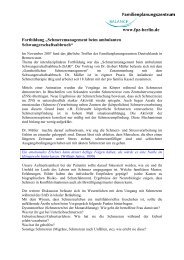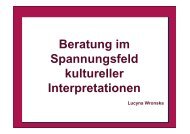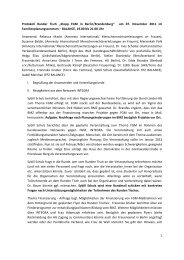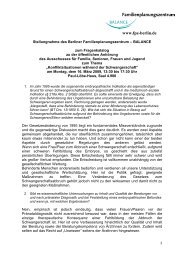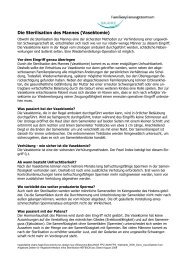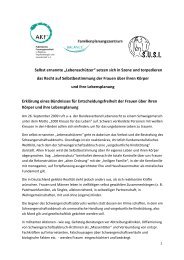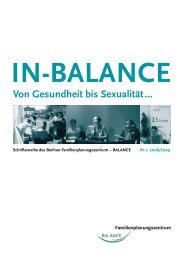Listening to African Voices - FPZ
Listening to African Voices - FPZ
Listening to African Voices - FPZ
You also want an ePaper? Increase the reach of your titles
YUMPU automatically turns print PDFs into web optimized ePapers that Google loves.
and an acceptable job, uniting the family or getting marriedand having children. Moreover, most of them are exposed <strong>to</strong>immense pressure <strong>to</strong> be successful and <strong>to</strong> provide financialsupport <strong>to</strong> the family left behind.Furthermore, <strong>African</strong> immigrants quickly become part of thenetwork of their country of origin. This network becomestheir new community; this is where they find familiarpractices, acceptance and support. As a minority, they areconfronted with considerable challenges during the integrationprocess. Their encounters and experiences with the hostsociety are often marked by discrimination and misunderstandings.This opens doors <strong>to</strong> negative emotions: feelingdisrespected, rejected, sad, angry or fearful about theirfuture. The willingness <strong>to</strong> integrate and <strong>to</strong> accept the valuesof the host society decreases; at the same time identificationwith <strong>African</strong> values and cus<strong>to</strong>ms becomes more intense.The defence or support of conservative traditions is often areaction <strong>to</strong> the perceived rejection of the host society. Whenimmigrants perceive an “attack” against <strong>African</strong> values ortraditions by Europeans, they retaliate in order <strong>to</strong> protectthemselves – not because they are in favour of the tradition,but <strong>to</strong> reject the interference from the unwelcominghost society. Immigrants from practicing families might bepersonally against FGM/C and provide effective protection<strong>to</strong> their daughters. But when seeing FGM/C condemnedby Europeans, they start making <strong>to</strong>lerant or even positiveremarks about the practice. This can be for various motives:• They don’t believe that Europeans understand the natureand cultural values attached <strong>to</strong> the practice;• They believe that the aim of Europeans is <strong>to</strong> destroy anddominate <strong>African</strong> culture;• They feel stigmatised and discriminated against or see thecondemnation as another attempt <strong>to</strong> discriminate against<strong>African</strong>s by focalising once more on a negative aspect of<strong>African</strong> culture.Thus, immigrants can tend <strong>to</strong> become silent or open supportersof FGM/C because the practice is criticised byEuropeans. The position advocating the preservation ofharmful traditional practices including FGM/C is often usedsimply <strong>to</strong> make a case against Europeans who they feelare imposing their own culture and control on <strong>African</strong>s. Inthe context of this dynamic, there are many immigrantswho consider FGM/C <strong>to</strong> be harmful or simply “useless” or“backward”, but it is not an issue that they would advocateagainst. Furthermore, the findings indicate a trend amongsome West <strong>African</strong> immigrants <strong>to</strong> become more conservativeand centred on traditional values after their arrival in Europe.One woman researcher resumed“They start living traditional values that they didn’t evenbelieve in or follow when they were still in Africa.”By the same <strong>to</strong>ken, their attitudes <strong>to</strong>wards FGM/C becomemore indulgent.These results speak against a leading role of Europeans inthe interventions against FGM/C. Their involvement migh<strong>to</strong>nly inject more fuel in<strong>to</strong> the polemical discussions on powerdynamics between Africa and the Western World.6.2. What positive outcomes do people associate withFGM/C and how common are these perceptions?The majority of immigrants from practicing families associatesone or several advantages with FGM/C. One importantpoint is social acceptance: those adhering <strong>to</strong> the traditionoccupy a different status within practicing societies, includingbenefits such as better marriage prospects and increasedinfl uence in community decisions. Further perceived advantagesare linked <strong>to</strong> the fundamental values of many <strong>African</strong>societies: the preservation of virginity until marriage and thefaithfulness of women <strong>to</strong> their husbands. Many immigrants,men and women alike, consider it as a benefit that – as theybelieve – circumcised women have less sexual desire and aretherefore less inclined <strong>to</strong> engage in sexual experiences thatare socially disapproved of. The findings showed that thisbelief is often reinforced after arriving in Germany. Whenobserving the lifestyle of German women and the way theyhandle their sexuality, numerous <strong>African</strong> immigrants aretaken aback or even shocked. They draw the conclusionthat German women are not faithful because they have notundergone FGM/C.Some immigrants, mainly from Gambia, Ethiopia and Nigeriaalso mentioned the aspect of hygiene and cleanliness. Theyfeel that the act makes the genital organs cleaner and moreattractive.For a minority of participants, FGM/C is also associated withreligious beliefs and practices, some even go so far as <strong>to</strong>consider it a requirement of their religion. This perceptionis considerably more common in men then in women. Thereare both Muslims and Christians who see a religious componentin practicing FGM/C, although the perception is morecommon among Muslims.6.3. What do they know about the risks and harmfulconsequences of FGM/C?The greater part of the participants showed a certain degreeof awareness about the risks and harmful consequences ofFGM/C. Pain, infections and sexual disadvantages for thewomen were most commonly known harms. It was notable,88<strong>Listening</strong> <strong>to</strong> <strong>African</strong> <strong>Voices</strong>






